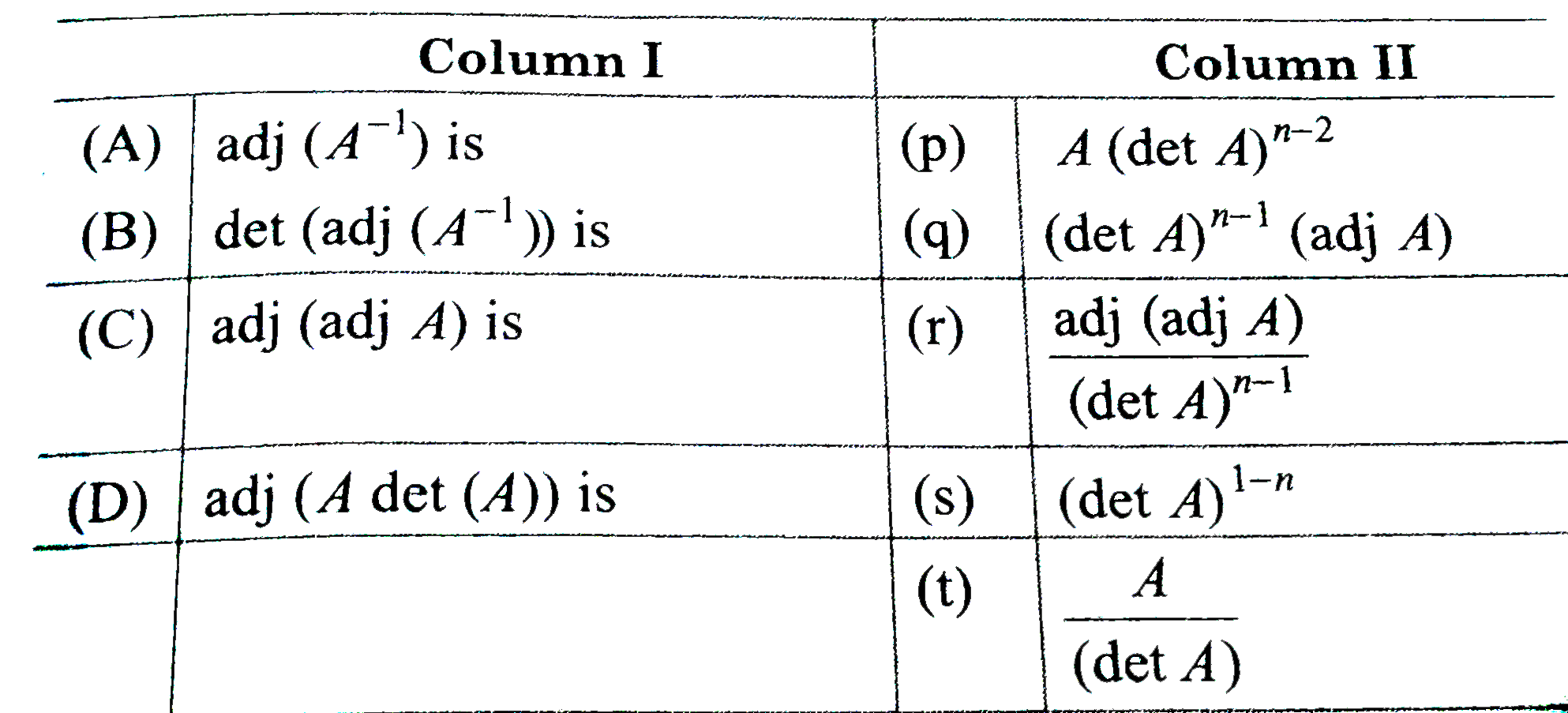If A is non singular then |A|=0. True or False.
The correct Answer is:F
To determine whether the statement "If A is non-singular then |A| = 0" is true or false, we can follow these steps:
1. Understand the Definitions:
- A singular matrix is defined as a square matrix whose determinant is equal to zero. This means that it does not have an inverse.
- A non-singular matrix is a square matrix whose determinant is not equal to zero. This means that it has an inverse.
2. Analyze the Given Statement:
- The statement claims that if matrix A is non-singular, then the determinant of A (denoted as |A|) is equal to zero.
3. Apply the Definitions:
- Since A is non-singular, by definition, we know that |A| ≠ 0 (the determinant is not zero).
- Therefore, the statement that |A| = 0 contradicts the property of non-singular matrices.
4. Conclusion:
- Since the determinant of a non-singular matrix cannot be zero, the statement "If A is non-singular then |A| = 0" is False.
Final Answer:
The statement is False.
---
- A singular matrix is defined as a square matrix whose determinant is equal to zero. This means that it does not have an inverse.
- A non-singular matrix is a square matrix whose determinant is not equal to zero. This means that it has an inverse.
- The statement claims that if matrix A is non-singular, then the determinant of A (denoted as |A|) is equal to zero.
- Since A is non-singular, by definition, we know that |A| ≠ 0 (the determinant is not zero).
- Therefore, the statement that |A| = 0 contradicts the property of non-singular matrices.
- Since the determinant of a non-singular matrix cannot be zero, the statement "If A is non-singular then |A| = 0" is False.
The statement is False.
Topper's Solved these Questions
- QUESTION BANK 2021BOOK - NAVNEET PUBLICATION - MAHARASHTRA BOARDCHAPTER - QUESTION BANK 2021EXERCISE - PART-1 (MATRICES) [FILL IN THE BLANKS)
10 Videos
- QUESTION BANK 2021BOOK - NAVNEET PUBLICATION - MAHARASHTRA BOARDCHAPTER - QUESTION BANK 2021EXERCISE - PART-1 (MATRICES) [SOLVE THE FOLLOWING]
6 Videos
- QUESTION BANK 2021BOOK - NAVNEET PUBLICATION - MAHARASHTRA BOARDCHAPTER - QUESTION BANK 2021EXERCISE - BINOMIAL DISTRIBUTION
20 Videos
- PROBABILITY DISTRIBUTIONBOOK - NAVNEET PUBLICATION - MAHARASHTRA BOARDCHAPTER - PROBABILITY DISTRIBUTIONEXERCISE - MULTIPLE CHOICE QUESTIONS
9 Videos
- THREE DIMENSIONAL GEOMETRY BOOK - NAVNEET PUBLICATION - MAHARASHTRA BOARDCHAPTER - THREE DIMENSIONAL GEOMETRY EXERCISE - MULTIPLE CHOICE QUESTIONS
8 Videos
Similar Questions
Knowledge Check
If A is a non-singular matrix, then
AA−1 is a non-singular matrix, thenBA−1is skew-symmetric if A is symmetricC∣∣A−1∣∣=|A|D∣∣A−1∣∣=|A|−1If A is a non-singular matrix, then A(adj.A)=
Aidentity matrixBnull matrixCscalar matrixDdiagonal matrixIf A, B are square matrices of order 3, A is non-singular and AB=0, then B is a
Anull matrixBunit matrixCsingular matrixDnon-singular matrix
If A is a non singular matrix; then prove that ∣∣A−1∣∣=|A|−1
View SolutionConsider the following statements :
1. If det A = 0, then det (adJ A) = 0
2. If A is non-singular, then det (A−1)=(detA)−1
View SolutionIf A, B are square matrices of order 3,A is non0singular and AB = O, then B is a
View SolutionIf B is a non singular matrix and A is a square matrix, the det(B−1AB)=
View SolutionIf A is non- singular martix and (A+l)(A−l)=0 then AA−1 = …….
View Solution

